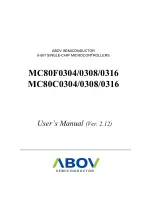
684
With the above processing, interrupt servicing or data transfer by the DMAC or DTC is possible.
If reception ends and the RDRF flag is set to 1 while the RIE bit is set to 1 and interrupt requests
are enabled, a receive data full interrupt (RXI) request will be generated. If an error occurs in
reception and either the ORER flag or the PER flag is set to 1, a transfer error interrupt (ERI)
request will be generated.
If the DMAC or DTC is activated by an RXI request, the receive data in which the error occurred
is skipped, and only the number of bytes of receive data set in the DMAC or DTC are transferred.
For details, see Interrupt Operation and Data Transfer Operation by DTC below.
If a parity error occurs during reception and the PER is set to 1, the received data is still
transferred to RDR, and therefore this data can be read.
Note:
For block transfer mode, see section 16.3.2, Operation in Asynchronous Mode.
Mode Switching Operation: When switching from receive mode to transmit mode, first confirm
that the receive operation has been completed, then start from initialization, clearing RE bit to 0
and setting TE bit to 1. The RDRF flag or the PER and ORER flags can be used to check that the
receive operation has been completed.
When switching from transmit mode to receive mode, first confirm that the transmit operation has
been completed, then start from initialization, clearing TE bit to 0 and setting RE bit to 1. The
TEND flag can be used to check that the transmit operation has been completed.
Fixing Clock Output Level: When the GM bit in SMR is set to 1, the clock output level can be
fixed with bits CKE1 and CKE0 in SCR. At this time, the minimum clock pulse width can be
made the specified width.
Figure 17-8 shows the timing for fixing the clock output level. In this example, GM is set to 1,
CKE1 is cleared to 0, and the CKE0 bit is controlled.
SCK
Specified pulse width
SCR write
(CKE0 = 0)
SCR write
(CKE0 = 1)
Specified pulse width
Figure 17-8 Timing for Fixing Clock Output Level
Interrupt Operation (Except Block Transfer Mode): There are three interrupt sources in smart
card interface mode: transmit data empty interrupt (TXI) requests, transfer error interrupt (ERI)
















































